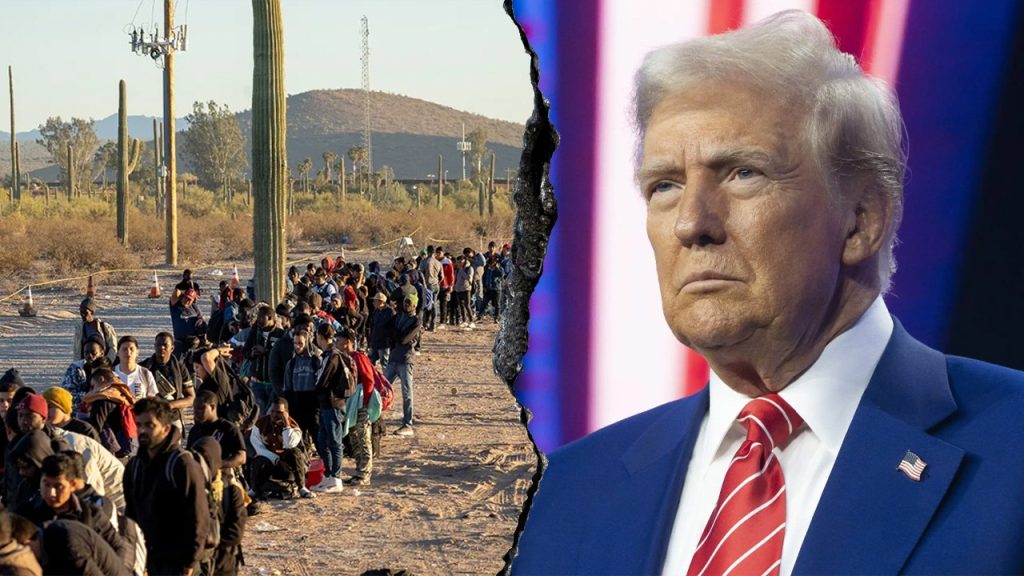The Court of Appeals for the D.C. Circuit is set to hear oral arguments regarding the Trump administration’s attempts to deport Venezuelan nationals under a 1798 wartime law. This development comes following a lower court’s order to halt deportations, which the administration claims undermines its executive authority. As tensions escalate in this legal battle, questions surrounding national security and the rights of individuals involved deepen.
| Article Subheadings |
|---|
| 1) Background of the deportation efforts |
| 2) Legal challenges and lower court’s rulings |
| 3) Implications of the court’s decision |
| 4) Reactions from government officials and legal experts |
| 5) Future of deportation policies |
Background of the deportation efforts
The Trump administration initiated its controversial plan to deport Venezuelan nationals, citing their involvement with criminal gangs, notably the Tren de Aragua (TdA), as a significant concern for national security. This effort draws upon a seldom-used law from 1798 that allows for swift deportation based on wartime authority. As the administration dwells upon historical statutes, they argue that current circumstances necessitate an expedited approach to mitigating threats posed by individuals within the U.S. who are believed to have ties to these gangs. The backdrop of deteriorating conditions in Venezuela has exacerbated the issue, as many of these individuals fled their homeland under dire circumstances, only to encounter new challenges in the U.S.
Legal challenges and lower court’s rulings
In a significant pushback, Judge James Boasberg, appointed by former President Obama, issued a ruling last week to stop any immediate deportations, stating that doing so would not only infringe upon the rights of the individuals involved but could also mandate further judicial oversight of executive actions. The lower court’s decision arose from concerns that deportations initiated under the 1798 law could be conducted without adequate judicial checks, infringing upon the well-established principles of due process. The judge ordered the administration to submit specified documentation regarding ongoing deportation flights and requested a detailed timeline of events surrounding these operations.
Implications of the court’s decision
The implications of the Court of Appeals decision will be multifaceted. Firstly, a ruling in favor of Judge Boasberg’s order could establish a precedent limiting the executive branch’s ability to unilaterally enforce deportations under historical wartime statutes without proper oversight. This could lead to increased scrutiny over future deportation policies, potentially affecting thousands of immigrants. Furthermore, the political ramifications could resonate within Congress, as legislators may call for an overhaul in immigration policy to ensure a balanced approach that considers both national security and individual rights.
Reactions from government officials and legal experts
The government has responded vigorously to the lower court’s ruling, claiming that it imposes “unauthorized imposition on the Executive’s authority” to enforce existing immigration laws. The DOJ reiterated that the executive branch must maintain its standing as a co-equal branch and asserted that judicial interference could hinder future negotiations pertaining to sensitive national security matters. Legal experts have weighed in on the debate, asserting that the case signifies not just a legal contest, but also a critical examination of the balance of powers between the branches of government and what constitutes a legitimate use of wartime powers in contemporary law. Advocates for immigrant rights, meanwhile, view the ruling as a significant victory, reinforcing the need to uphold individual rights and legal protections regardless of nationality.
Future of deportation policies
As the legal battle unfolds, the future of deportation policies remains uncertain. The outcome of this case could herald a broader examination of how immigrant rights are enacted and enforced in the U.S., especially regarding individuals from high-crime areas in other countries. It brings to light critical discussions around the immigration system, potential reforms, and the humanitarian implications of deportations. As public opinion on immigration remains deeply divided, the ramifications of the court’s decision will likely influence both current policies and the political landscape moving forward. Future administrations may face increased pressure to approach deportation with a more nuanced understanding of individual circumstances alongside national security considerations.
| No. | Key Points |
|---|---|
| 1 | The Trump administration’s deportation efforts are predicated on a 1798 wartime law. |
| 2 | Judge James Boasberg halted deportations after ruling they violated individual rights and required more judicial oversight. |
| 3 | The potential ruling by the Court of Appeals could establish precedents affecting executive power and immigration policy. |
| 4 | Responses from government officials highlight the tension between judicial oversight and executive authority in national security. |
| 5 | The case may impact future deportation policies and lead to reforms in immigration practices across the U.S. |
Summary
The ongoing legal dispute surrounding the Trump administration’s use of a 1798 wartime law to deport Venezuelan nationals has far-reaching implications for immigration policy and executive authority. As the Court of Appeals prepares to deliberate on the matter, the potential outcomes may redefine the balance of power among government branches and set a significant precedent for treatment of immigrants in the United States. This case encapsulates crucial debates over national security and individual rights that will shape the Biden administration’s approach to immigration moving forward.
Frequently Asked Questions
Question: What is the legal basis for the Trump administration’s deportation efforts?
The administration is invoking a law from 1798 that authorizes the executive branch to take swift action in deporting individuals deemed as threats, particularly in wartime contexts.
Question: Why did Judge Boasberg halt the deportations?
Judge Boasberg halted the deportations on the grounds that the actions taken by the administration could infringe upon the rights of the deported individuals and required further judicial review.
Question: What could be the broader implications of this case?
The case may redefine executive power concerning immigration policy, influencing how future administrations handle deportations and negotiations surrounding national security issues.


